Educating strong and focused
trilingual professionals for success
in a Chinese-language milieu 
 Project for Promotion of
Project for Promotion of
Global Human Resource Development
The Japanese Ministry of Education, Culture, Sports, Science and Technology instituted
the Project for Promotion of Global Human Resource Development to provide funding
for selected university initiatives aimed at counteracting the insular tendencies of Japan’s
younger generation and developing human resources that can play an active role in our global
society. In conjunction with this program, Kyorin University’s Faculty of Foreign Studies
was awarded a fiscal year 2012 grant for its plan to educate strong and focused Japanese-
Chinese-English trilingual professionals for success in a Chinese-language milieu.*
* Kyorin University’s initiative was one of 42 fiscal 2012 grant-winning proposals, selected from 152
applications submitted by national, public, and private universities around Japan.
Kyorin University’s Global Education Initiative
The focus of Kyorin University’s global human resource development initiative is trilingual
training designed to equip our students with the Japanese, Chinese, and English language
skills and competencies needed to function effectively in a Chinese-speaking milieu. As
we see it, the program’s selection for a government grant is both a validation of Kyorin
University’s wide-ranging trilingual education efforts to date and a call to build an even
stronger program.
So, just what is Kyorin University doing to meet these expectations? In the following pages,
we offer a closer look at our global education efforts.
■Educating Strong and Focused Trilingual Professionals for Success in a Chinese-Language Milieu
■Developing Advanced Language Skills
■Training Strong and Focused Negotiators
■Promoting and Supporting Study Abroad
■Program Requirements and Assessment
■Community Linkages for Learning / Next Steps

Chinese in the Spotlight
Japan and China have a history of interaction going back 2000 years, and maintaining this amicable relationship is essential to both countries. Kyorin University’s program develops the competencies needed for effective professional interaction in a world of ever-stronger bilateral ties, particularly in business and economic affairs.
Step 1: Language Proficiency
The first component of this global initiative involves building our capacity to nurture trilingual fluency in Japanese, Chinese, and English. To this end, we have made Chinese language study a requirement not only for those majoring in Chinese Communication but for all students enrolled in the Faculty of Foreign Studies.
Step 2: Higher Skills
To build a multifaceted understanding of Asia-Japan included-students learn about its history, culture, economics, and industry, through courses offered in conjunction with the university’s Faculty of Social Sciences and Graduate School of International Cooperation Studies. They also participate in active learning, including case-study seminars, so as to build the skills and confidence needed to negotiate on an equal footing and arrive at creative solutions (see page 6).
Step 3: Study Abroad
By living and studying abroad, students acquire advanced language and communication competencies (including strong and focused negotiation skills). The goal is for all students in the Department of Chinese Communication, and at least half of all students in the Department of English, to have studied abroad by the time they graduate.
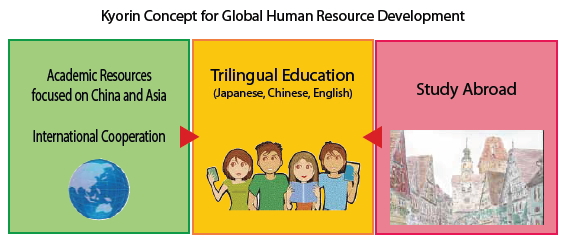

Targets: HSK level 5,![]() score of 800+
score of 800+
Language proficiency goals under the new program are HSK level 5* for Chinese and a ![]() score of 800 or higher in English.
score of 800 or higher in English.
* Learners at HSK level 5 are able to understand Chineselanguage newscasts, use Chinese fluently in a business setting, and study at a top Chinese university.

●Foreign Language Instruction Using Original Teaching Materials
Chinese for International Communication
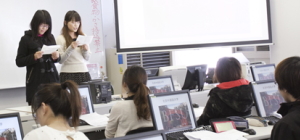 In Japan, people who can communicate effectively in Chinese
are still few and far between. The Chinese for International
Communication (CIC) is a practical Chinese-language program
designed to build skills step by step-beginning with basic
Chinese, then mastering everyday conversation and ultimately
acquiring the proficiency to study overseas or do business in
Chinese. Students in the CIC program will be able to use
Chinese in the real world after just two years of study.
In Japan, people who can communicate effectively in Chinese
are still few and far between. The Chinese for International
Communication (CIC) is a practical Chinese-language program
designed to build skills step by step-beginning with basic
Chinese, then mastering everyday conversation and ultimately
acquiring the proficiency to study overseas or do business in
Chinese. Students in the CIC program will be able to use
Chinese in the real world after just two years of study.
Practical English Program
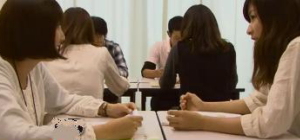 The Practical English Program (PEP) is a program that trains
students not just to use English like a native speaker but to
actually think in English. Using original textbooks, this course
of study is built on a routine of imitating, practicing, and finally
internalizing the language as it is actually used today. Students
in this two-year course program master English by speaking,
listening, and “feeling” it on a daily basis.
The Practical English Program (PEP) is a program that trains
students not just to use English like a native speaker but to
actually think in English. Using original textbooks, this course
of study is built on a routine of imitating, practicing, and finally
internalizing the language as it is actually used today. Students
in this two-year course program master English by speaking,
listening, and “feeling” it on a daily basis.
●Chinese Salon and English Salon

The Chinese and English salons are dedicated exclusively to conversation in Chinese and English. Students
gather here to chat or to exchange ideas on specific subjects with native speakers, including international
students and instructors. The English Salon has been open since 2010, while the Chinese Salon was launched in
October 2012.
Chinese and English communication spaces are springing up all over campus. Through daily interaction with
native speakers, students acquire international communication skills naturally.
●e-Learning
Kyorin University students are able to take advantage of
language instruction not just in the classroom but anywhere
with Internet access, whether on campus, at home, or
overseas. Our e-Learning system allows students to track
their own progress and performance and get faculty advice
just when they need it.
●Live Foreign-Language TV Broadcasts
Students can watch live foreign-language news broadcasts from networks like the BBC, CNN, and China’s
CCTV in the Chinese and English salons, as well as in the cafeterias, Student Hall, and other common areas.
The campus offers a wealth of opportunities for contact with foreign languages and culture.

Beyond Language Learning: Mastering the Art of Global Communication
People who want to make the world their professional arena need to cultivate a genuine understanding of other
cultures-not to mention their own. Students in our program deepen their knowledge of Asia and other regions
in classes offered by the Faculty of Social Sciences, while developing truly global communication skills in casestudy
simulation seminars.
●Classes in the Faculty of Social Sciences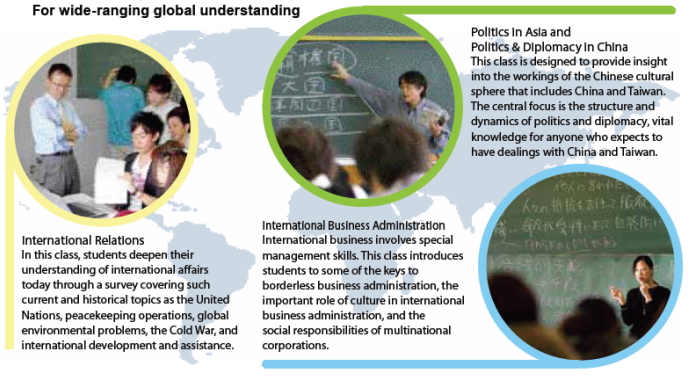
●Case-Study Seminars
For anyone seeking to acquire real-world negotiation skills, problem-based learning is a must. In our
interdisciplinary case-study seminars, offered jointly by the Faculty of Foreign Studies and the Faculty of Social
Sciences, students are presented with a real-life conflict in the diplomatic or business arena and must hammer out a
resolution together. Through these simulation exercises, students experience first-hand the challenge and excitement
of crafting solutions through discussion and debate and take the first steps to becoming skilled negotiators.
●Debate Simulation through Active Learning
 For students in the upper levels, case‐study seminars become
training grounds in which to learn the persuasive tactics and
debate techniques so important to international business affairs.
For students in the upper levels, case‐study seminars become
training grounds in which to learn the persuasive tactics and
debate techniques so important to international business affairs.
Doing business with people of different nationalities requires
smart negotiation grounded in understanding and respect for
different cultures. At the same time, it demands expressive
communication skills to effectively convey one’s own point of
view to others. In our active learning method, students learn the
importance and techniques of two‐way communication.
In debate simulation classes taught by native English speakers,
students come to understand the challenges of cross-cultural
communication and learn how to express themselves effectively
on a variety of topics.
●The Active Learning Studio
For a more active style of teaching and learning
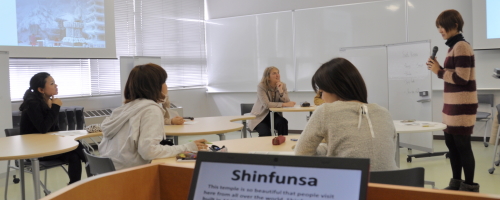
In the 2012 academic year, the Faculty of Foreign Studies held its first classes in the new Active Learning
Classroom, an innovative space specially designed and equipped to facilitate a more active style of teaching and
learning.
In the Active Learning Classroom, tables and chairs are easily rearranged to tailor the space for groups ranging
from a handful of students to several dozen. The room is equipped with computers that allow quick access to
documents and information and electronic blackboards that facilitate instruction in report writing and
presentation preparation. These and other design features encourage lively classroom interaction for active
learning.

●International Programs
Kyorin University offers opportunities for study
abroad under a reciprocal exchange program, a
one-way exchange program, and a semester
abroad program. Students can choose the
destination and the duration-from three months
up to a year-best suited to their needs and
abilities. Since study abroad under these
programs counts as university enrollment,
students can often graduate in four years even
after spending time overseas. The university also
offers short-term overseas courses and learning
experiences during the school’s summer and
spring breaks. In many cases credits earned abroad are transferable.
Each year roughly 100 of our students take advantage of these programs to study in countries and regions
around the world, including the United States, the United Kingdom, China, and Taiwan.
(See page 9 for a summary of major international programs and host schools.)
●Comprehensive Support to Promote Study Abroad
The Kyorin University Center for International Communications provides a wide range of services to support and encourage study abroad. We also assist students returning to campus from overseas to ensure a smooth academic transition. Our Career Support Center provides individual counseling and information on job openings primarily in companies where graduating students can put their international experience to use. In addition, members of our faculty periodically visit the overseas universities hosting a significant number of Kyorin exchange students.
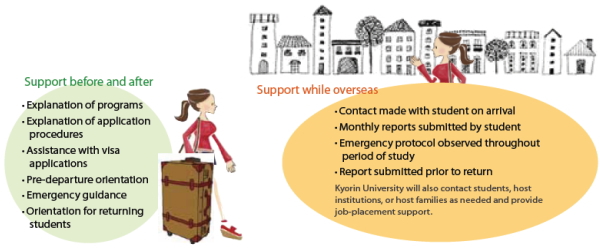
●Major International Programs
| Reciprocal Exchange Program |
| One-year program of study at an overseas partner university; students exempt from host-school tuition |
| Major Host Schools for Reciprocal Exchange |
| Beijing Foreign Studies University, Beijing International Studies University, Beijing Language and Culture University, Shanghai International Studies University, Hebei University, Chinese University of Hong Kong, National Chengchi University (Taiwan), Korea University (South Korea), Christchurch Polytechnic Institute of Technology (New Zealand) |
| One-Way Exchange and Semester Abroad Programs |
| Students spend a year or semester (half year) studying abroad at a partner school or other institution. In this program, students pay host-school tuition but receive an 80% discount on tuition payable to Kyorin University. |
| Major Host Schools for One-Way Exchange and Semester Abroad |
| Beijing Language and Culture University, Beijing International Studies University, Shanghai International Studies University, Hebei University, National Chengchi University, University of Wollongong (Australia), Deakin University (Australia) |
| Other Host Schools (Medium-Term Study) |
| University of Victoria (Canada), University of Toronto (Canada), University of Manchester (UK), Chichester College (UK), University of California, Irvine (US), Christchurch Polytechnic Institute of Technology (New Zealand), and more. |
| Learning Abroad |
| The university offers a variety of valuable opportunities to acquire international experience through language training and other learning activities overseas. These include medium-term study programs and short-term study trips offered during summer or spring break. |
| Major Learning Abroad Program Sites |
| Oxford, England; University of Queensland, Australia; Los Angeles CA, USA; Vancouver, Canada. |
●Financial Assistance for Study Abroad
Students who study abroad under our Reciprocal Exchange Program are exempt from tuition at the host institution. Other programs offer participants an 80% reduction in their Kyorin University tuition during their period of study overseas. In addition, many students take advantage of Kyorin University scholarships to support their overseas studies. Students may also be eligible for scholarships from the Japan Student Services Organization.
●Japan Culture Project
Communicating actively with our
overseas partner schools
With this project we aim to take the initiative in communicating information to our overseas partner schools. Subjects include Japanese culture and industry, as well as Kyorin University’s traditional strong suits of healthcare and foreign-language education.
●Trilingual University Website
Communicating actively to Japanese, Chinese, and English speakers
Work is under way to provide Chinese and English versions of the Global Education Initiative pages of the
Kyorin University website to make university information more accessible to our overseas partner institutions
and others.

●Presentations and Competition Sessions
At each major juncture in every program, students are required to give presentations or reports so that their
academic progress can be evaluated. Students also receive feedback and advice from evaluators at this time so
that they can take stock of their own progress.
Study-Abroad Completion Presentation: Each student participating in one of our overseas programs,
regardless of duration, will deliver a presentation in Chinese or English at its conclusion on some topic of
interest relating to his or her experience.
Graduate Thesis Competition Session: Graduating seniors will present and defend their graduation
theses in English or Chinese at a competitive session.
(Objective Outside Evaluations)
Evaluators include Kyorin University faculty members, international students studying at the university, and
also outside evaluators, such as faculty members at overseas partner institutions and experts from the private
sector. The evaluations provide students with a comprehensive assessment of their global communication skills.
●Language Proficiency Standards for Graduating Students
◆ Chinese Language
Department of Chinese Communication: Proficiency consistent with HSK level 5 or higher
・Students understand presentations and news broadcasts delivered in Chinese by native speakers and can communicate
their own ideas to others in Chinese.
・ Students can interact effectively with native Chinese speakers in a business or international-cooperation setting via
spoken conversation and email.
Departments of English and Hospitality & Tourism : Ability consistent with HSK level 2 or higher
・Students grasp basic idea when listening to everyday spoken Chinese.
・ Students can introduce themselves and discuss everyday matters in Chinese.
| Department of Chinese Communication (Japanese‐Chinese Interpreting and Translation) |
・ HSK level 5 or higher (minimum proficiency for study at top Chinese university) |
Departments of English and Tourism & Hospitality |
・ HSK level 2 or higher (everyday conversational proficiency) ・ Chuken level 4 or higher |
◆ English Language
Department of Chinese Communication:Ability consistent with ![]() score of 500 or higher
score of 500 or higher
・ Students grasp basic idea when listening to everyday spoken English.
・ Students can introduce themselves and discuss everyday matters in English.
Departments of English and Hospitality & Tourism:Ability consistent with ![]() score of 800 or higher
score of 800 or higher
・ Students understand presentations and news broadcasts delivered in English by native speakers and can communicate
their own ideas to others in English.
・ Students can sight-read English newspaper and magazine articles and can communicate their own ideas to others in
English.
| Department of Chinese Communication (Japanese‐Chinese Interpreting and Translation) |
・ ・ TOEFL |
| Departments of English and Tourism & Hospitality |
・ ・ TOEFL |

As a grant recipient, Kyorin University is committed to providing a variety of learning opportunities for high school and university students who show promise in achieving global competency and leadership.
●Global Businesses Today
Symposiums and presentations
 The university holds symposiums and other events for high
school, undergraduate, and graduate students, as well as
corporate employees. Speakers include outside experts involved
in global business and human resource development.
The university holds symposiums and other events for high
school, undergraduate, and graduate students, as well as
corporate employees. Speakers include outside experts involved
in global business and human resource development.
●What Kind of Leadership Is Business Looking For?
Interaction between global business people and Kyorin students
The university expands opportunities for students at Kyorin University to interact with Japanese and non-
Japanese employees of global businesses and learn what sort of global competencies are in demand in the world
of work.

●Launch of New Certificate Programs
With the selection of Kyorin University as a grant recipient, the Faculty of Foreign Studies will institute three
new certificate programs aimed at nurturing trilingual (Japanese-Chinese-English) competency.
◆ Global Human Resource Development for a Chinese-Language Milieu
◆ Global Human Resource Development for an English-Language Milieu
◆ Japanese-Language Teacher Training
Students fulfilling the academic requirements of these programs will receive certificates of completion.
●Toward University-wide Globalization
In the 2013 academic year, Kyorin University will begin expanding its initiatives for global human resource
development from the Faculty of Foreign Studies to other faculties so as to advance globalization at the
university level. As a center for global education initiatives, Kyorin University will work actively to develop and
deploy programs that can serve as a model for other universities and the entire region.
![]() Kyorin University Center for International Communications
Kyorin University Center for International Communications
476 Miyashita-machi, Hachioji-shi, Tokyo 192-8508 Japan Phone +81-42-691-0011

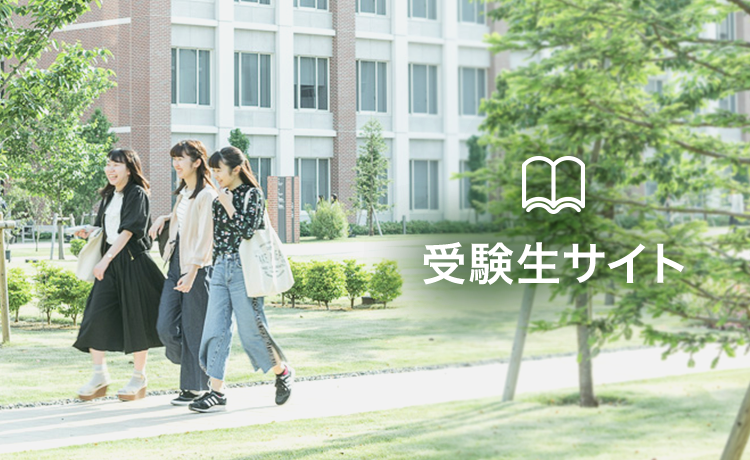
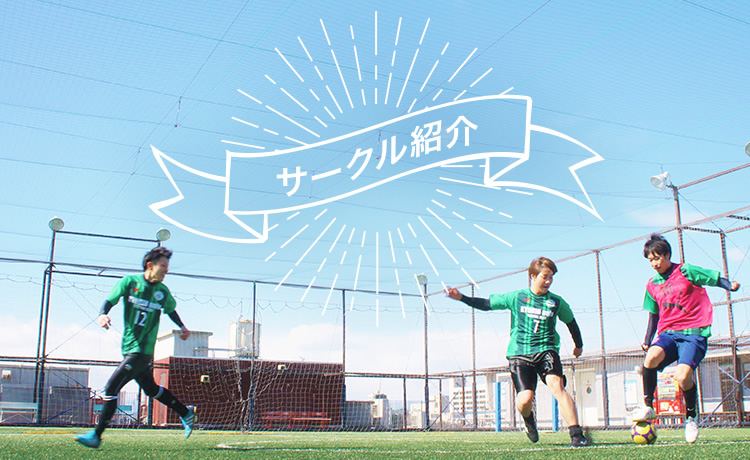
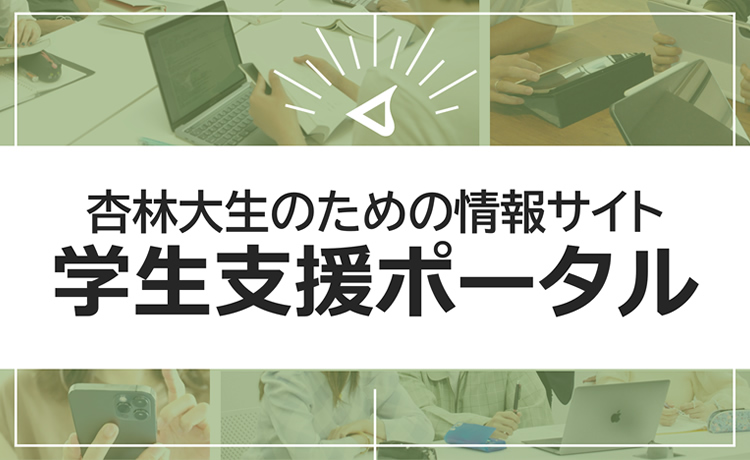
![学納金サイト [在学生・保護者専用]](/assets/images/BlkFeatured_item_tuition.jpg)
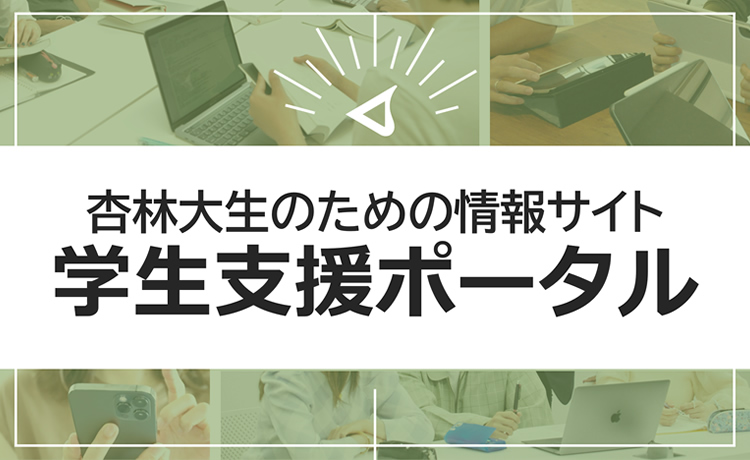
 score of 500 or higher
score of 500 or higher